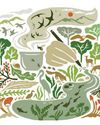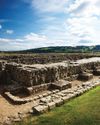
Quite simply, the Pennine Way is Britain's most iconic National Trail-a 268-mile trek along the spine of England, traversing three National Parks and the North Pennines Area of Outstanding Natural Beauty.
Over 15-20 days, Pennine Way walkers will clock up the equivalent of 1.3 ascents of Everest, gained by scaling a succession of lofty summits and elevated plateaus across Northern England's most spectacular upland terrain.
It isn't the longest National Trail - that would be the 630-mile South West Coast Path, immortalised in Raynor Winn's bestseller, The Salt Path. And it isn't the toughest long-distance hike; that is widely acknowledged to be the Cape Wrath Trail-a 230-mile odyssey through some of the most remote wilderness in the Scottish Highlands. But it is the original designated National Trail and, to the tens of thousands of folk who have walked it, still the best-right up there with the world's greatest hikes, such as the Appalachian Trail and El Camino de Santiago.
After walking the Pennine Way in 2010, Poet Laureate Simon Armitage summed up the experience with a characteristically pithy coda: "To embark on the walk is to surrender to its lore, and to submit to its logic, and to take up a challenge against the self."
GETTING STARTED
The Pennine Way starts - appropriately enough-at Edale in the shadow of Kinder Scout in the Peak District National Park. This was the backdrop for a series of mass trespasses in the 1930s. From Kinder, the route meanders for more than 250 miles through the northern uplands, traversing increasingly wild and remote terrain to reach the Scottish Border at the hamlet of Kirk Yetholm.
Which way to walk - from north or south?
Bu hikaye BBC Countryfile Magazine dergisinin August 2023 sayısından alınmıştır.
Start your 7-day Magzter GOLD free trial to access thousands of curated premium stories, and 9,000+ magazines and newspapers.
Already a subscriber ? Giriş Yap
Bu hikaye BBC Countryfile Magazine dergisinin August 2023 sayısından alınmıştır.
Start your 7-day Magzter GOLD free trial to access thousands of curated premium stories, and 9,000+ magazines and newspapers.
Already a subscriber? Giriş Yap

TOP 10 REMOTE PLACES IN THE UK
There's something aweinspiring about a place that's remained untamed. Dixe Wills picks his favourite wild sites

Pub closures and fewer hops leave UK brewers in a fight for survival
Fancy a pint?

Will a new national trail provide better access to nature?
Before sitting down to write this I went for a brisk walk along a public footpath at the edge of my village and felt much better for it.

BRITAIN'S 'ROYAL FISH' ON THE BRINK OF EXTINCTION
Urgent conservation action is required if we're to save the sturgeon from disappearing from UK waters, say experts

STRATEGIC TREE PLANTING TAKES ROOT
New agroforestry guide helps farmers meet environmental goals

Coalition of the willing
Growing a rainforest takes time, ingenuity and passion.Oh, and a bit of dragon skin. Danny Graham meets the people fighting to save Scotland's rare habitats

Noticing nature daily can help us understand ourselves and the world
For over 120 years, The Guardian's Country Diary has delivered a daily portrait of an intimate view of the countryside (or nature, wherever we find it) from across Britain.

“WITCHES MARKS’ FOUND AT MEDIEVAL MANOR HOUSE
The staggering” number of carved rituals elevates 15th-century Gainsborough Old Hall to one of Britain’s spookiest buildings

Poison on your pooch?
You want to protect your dog from fleas and ticks, but the treatments may be contaminating our rivers, say scientists. James Fair looks at the best ways to fight parasites, for both pets and planet

RARE ROMAN KNIFE HANDLE DISCOVERED AT HADRIAN’S WALL
Find in the River Tyne in Northumberland proves celebrity cult’ of gladiators, say experts